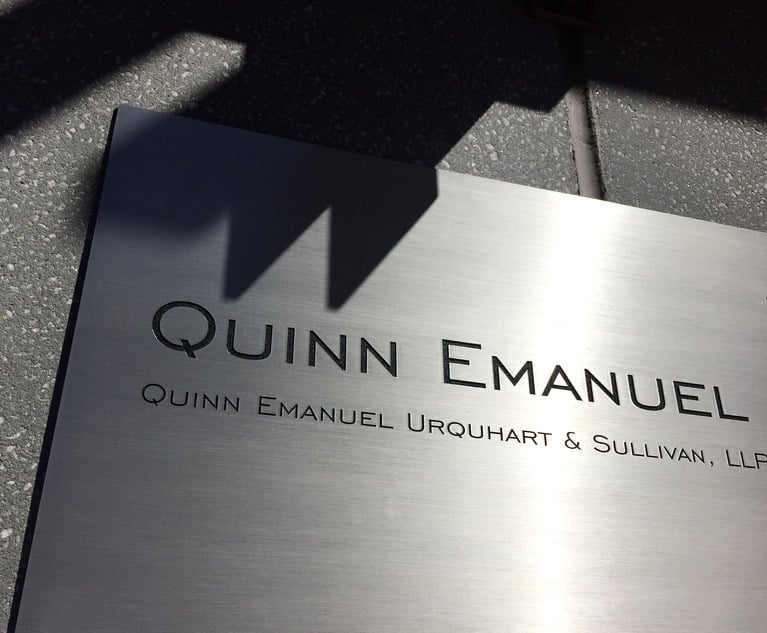Revolving doors - London partner churn at US firms reaches new heights
As Cobbetts this week looked to be taking its final steps towards obsolescence and a pre-pack deal with DWF, new research from Legal Week has found US firms' activities on this side of the pond moving in an entirely more positive direction. Casting aside the seemingly perpetual economic gloom, firms have turned their attention to London expansion, with our latest survey into the hiring trends of US players in the City demonstrating record levels of partner recruitment.
February 07, 2013 at 07:03 PM
3 minute read
As Cobbetts this week took its final steps towards obsolescence and a pre-pack deal with DWF, new research from Legal Week has found US firms' activities on this side of the pond moving in an entirely more positive direction.
Casting aside the seemingly perpetual economic gloom, firms have turned their attention to London expansion, with our latest survey into the hiring trends of US players in the City demonstrating record levels of partner recruitment.
Of course, with some 35 partners joining the lateral market as a result of Dewey's collapse, a year-on-year rise in partner moves was inevitable.
But Dewey accounts for only part of the story, with recruitment well up on what was already a record high in 2011, even without those fleeing the failed firm.
In fact, so steady has US firms' expansion been over here, that they made almost twice as many partner hires in London in 2012 as in 2007, with recruitment increasing every year with the exception of 2009.
But closer inspection of the moves reveals that, while hiring may be up, the threat this is posing to major UK firms is not rising at the same pace.
Overall, 37% of last year's hires moved from rival US firms rather than UK players.
And only 71% of them joined direct from partnerships at other firms–with the rest either coming from in-house positions or more junior roles at rivals.
It means that, with the odd exception, a relatively small percentage of the moves are Wall Street leaders poaching the magic circle's star dealmakers.
Instead, as growing numbers of US firms of all shapes and sizes bulk up their UK presence and become more established in their own right, there is increasingly a revolving door operating between them, with partners carrying out multiple moves between US firms rather than staying put.
The trend is evidenced by the fact that around 11% of all those who were partners on 1 January this year had only joined their current firms within the last 12 months.
While the statistic itself is neither good nor bad, some of the implications are distinctly negative.
How do firms go about building up a practice with both established names and client bases against the backdrop of so much movement? Especially as those who have already been willing to make the jump to a US firm once are more likely to do it again.
The answer appears to be with difficulty. A quick comparison of shifts in partner headcount and hiring over the last few years shows many of the most prolific law firm recruiters have struggled to maintain their partner numbers in the face of multiple departures, commonly to US rivals.
While using the opportunities presented by a downturn to grow your business is to be applauded, simply making the hires is not enough.
Firms need to start paying as much attention to how they retain partners as to bringing them in: they are now an established hunting ground for US rivals.
This content has been archived. It is available through our partners, LexisNexis® and Bloomberg Law.
To view this content, please continue to their sites.
Not a Lexis Subscriber?
Subscribe Now
Not a Bloomberg Law Subscriber?
Subscribe Now
NOT FOR REPRINT
© 2025 ALM Global, LLC, All Rights Reserved. Request academic re-use from www.copyright.com. All other uses, submit a request to [email protected]. For more information visit Asset & Logo Licensing.
You Might Like
View All
Withers Hires Disputes Partner From Morgan Lewis to Lead Litigation Group in Singapore

Charles Russell Speechlys Hires Investment Funds Head from PwC Legal Affiliate in Hong Kong

What Happens When a Lateral Partner's Guaranteed Compensation Ends?

Quinn Emanuel's Hamburg Managing Partner and Four-Lawyer Team Jump to Willkie Farr
Trending Stories
Who Got The Work
J. Brugh Lower of Gibbons has entered an appearance for industrial equipment supplier Devco Corporation in a pending trademark infringement lawsuit. The suit, accusing the defendant of selling knock-off Graco products, was filed Dec. 18 in New Jersey District Court by Rivkin Radler on behalf of Graco Inc. and Graco Minnesota. The case, assigned to U.S. District Judge Zahid N. Quraishi, is 3:24-cv-11294, Graco Inc. et al v. Devco Corporation.
Who Got The Work
Rebecca Maller-Stein and Kent A. Yalowitz of Arnold & Porter Kaye Scholer have entered their appearances for Hanaco Venture Capital and its executives, Lior Prosor and David Frankel, in a pending securities lawsuit. The action, filed on Dec. 24 in New York Southern District Court by Zell, Aron & Co. on behalf of Goldeneye Advisors, accuses the defendants of negligently and fraudulently managing the plaintiff's $1 million investment. The case, assigned to U.S. District Judge Vernon S. Broderick, is 1:24-cv-09918, Goldeneye Advisors, LLC v. Hanaco Venture Capital, Ltd. et al.
Who Got The Work
Attorneys from A&O Shearman has stepped in as defense counsel for Toronto-Dominion Bank and other defendants in a pending securities class action. The suit, filed Dec. 11 in New York Southern District Court by Bleichmar Fonti & Auld, accuses the defendants of concealing the bank's 'pervasive' deficiencies in regards to its compliance with the Bank Secrecy Act and the quality of its anti-money laundering controls. The case, assigned to U.S. District Judge Arun Subramanian, is 1:24-cv-09445, Gonzalez v. The Toronto-Dominion Bank et al.
Who Got The Work
Crown Castle International, a Pennsylvania company providing shared communications infrastructure, has turned to Luke D. Wolf of Gordon Rees Scully Mansukhani to fend off a pending breach-of-contract lawsuit. The court action, filed Nov. 25 in Michigan Eastern District Court by Hooper Hathaway PC on behalf of The Town Residences LLC, accuses Crown Castle of failing to transfer approximately $30,000 in utility payments from T-Mobile in breach of a roof-top lease and assignment agreement. The case, assigned to U.S. District Judge Susan K. Declercq, is 2:24-cv-13131, The Town Residences LLC v. T-Mobile US, Inc. et al.
Who Got The Work
Wilfred P. Coronato and Daniel M. Schwartz of McCarter & English have stepped in as defense counsel to Electrolux Home Products Inc. in a pending product liability lawsuit. The court action, filed Nov. 26 in New York Eastern District Court by Poulos Lopiccolo PC and Nagel Rice LLP on behalf of David Stern, alleges that the defendant's refrigerators’ drawers and shelving repeatedly break and fall apart within months after purchase. The case, assigned to U.S. District Judge Joan M. Azrack, is 2:24-cv-08204, Stern v. Electrolux Home Products, Inc.
Featured Firms
Law Offices of Gary Martin Hays & Associates, P.C.
(470) 294-1674
Law Offices of Mark E. Salomone
(857) 444-6468
Smith & Hassler
(713) 739-1250








